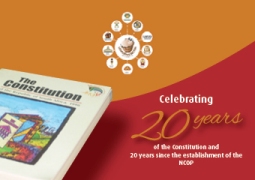
Sixty-one years on, the heroism of the 1956 Women’s March still endures. The passing of time has not diminished its importance in South Africa’s yearly calendar of important political events. The march not only challenged the received beliefs of race, it also redefined the role of women political activism and citizenship in South Africa. These women’s voices of conscience, which exposed and denounced repression in all its forms, still resonate with us to this day. Hence August, the month in which the march took place, is commemorated as Women’s Month and the march is recognised as a moment in history that is as remarkable as it is courageous.
The march heralded a new breed of gallant and sharp-minded women, who took the baton from their forbearers to wage contemporary struggles against the tribulations faced by women in this country. In post-apartheid South Africa, the women’s struggle for emancipation from the whims of patriarchy is reflected in our Constitution, which promulgated non-sexism as one of the core principles of South African democratic dispensation.
Despite these constitutional declarations, gender disparity persisted. It took broad-based lobbying and advocacy from women’s groupings to raise the gender-based discriminatory practices as political and human rights matters requiring urgent attention.
Subsequently, the role of women’s groups in the mainstreaming of gender polices has been critical to the development of appropriate policies to deal with these undesirable practices.
Out of this emerged Women’s caucuses in the South African Legislative Sector, the Commission for Gender Equality and the Ministry for Women in the Presidency, which fight for the promulgation of gender parity in all spheres of life. These gender machineries advocated for legislation that sought to address gender disparities that subject them to subservient roles in a male-dominated society.
The celebration of 20 years of the Constitution has prompted the need for the assessment of the efficacy of the laws and legal framework governing gender parity. The establishment of the High Level Panel, charged with the task of reviewing the effectiveness of key legislation, is expected to come with some practical recommendations that will address the gender equality deficit that we are still experiencing in this country.
The International Women’s Conference that took place at Parliament during Women’s Month, titled Women in the Changing World of Work, deliberated the challenges brought to bear by the digital revolution on women at work. Women parliamentarians across Africa and from various civil organisations shared experiences of gender disparities in their respective countries and decried how gender disparities are depriving them of social and economic mobility. But also they pondered: how can women be expected to embrace the digital revolution when the historically biased attitudes regarding women and their role in society let alone the workplace has not yet changed.
One of the issues raised and agreed upon was that there is a need by women parliamentarians to resuscitate the internal instruments, such as the Beijing Platform of Action, whose resolve is to advance the goals of equality, development and peace for all women everywhere in the interest of all humanity.
Another such instrument is the Sustainable Development Goal 5, which states: “Gender inequality persists worldwide, depriving women and girls of their basic rights and opportunities. Achieving gender equality and the empowerment of women and girls will require more vigorous efforts, including legal frameworks, to counter deeply rooted gender-based discrimination that often results from patriarchal attitudes and related social norms.”
In this regard, the conference sought to build upon and reinforce international instruments that seek to abolish gender disparity and bring about women’s advancement in all spheres of human activity. It resolved that women’s economic empowerment is central to their self-actualisation. This includes the right to decent work and full and productive employment as a critical means of implementing SDG 5 on achieving gender equality.
“But this continues to be hampered by gender inequalities in labour markets and the pace and scale of transformation towards the realisation of women’s economic empowerment has been unacceptably slow. Parliaments have a critical role to play in overseeing that the pace of change is accelerated” the conference resolved.
Abel Mputing
6 September 2017

